Summary | Excerpt | Reviews | Beyond the Book | Read-Alikes | Genres & Themes | Author Bio
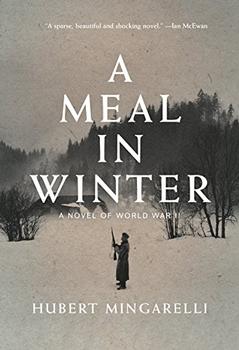
Critics' Opinion:
Readers' Opinion:
First Published:
Jul 2016, 144 pages
Paperback:
Oct 2018, 144 pages
 Book Reviewed by:
Book Reviewed by:
Donna Chavez
Buy This Book
This article relates to A Meal in Winter
Hubert Mingarelli's characters in A Meal in Winter have to dehumanize an entire race of people in order to justify carrying out Hitler's mass genocide during World War II. The narrator of the story even goes so far as to resent the Jews because of the very details that remind him of their humanity – "a piece of embroidery, coloured buttons, a ribbon in the hair." He can't tolerate viewing them as human beings. That and the men's unimaginable nightmares about their horrific tasks notwithstanding, the three Nazi soldiers proceed to carry out their commandant's orders as best they know how.
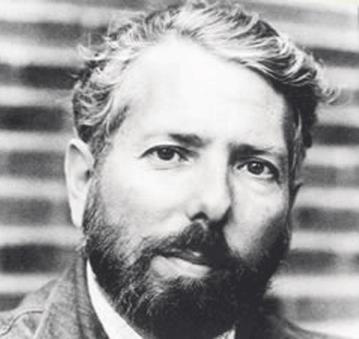 In the early 1960s, Yale University social psychologist Stanley Milgram, himself the son of Jews that escaped the Holocaust, wondered how ordinary people could be persuaded to act so pitilessly as the Nazi war criminals. He wanted to know how anyone could stoop to murder someone who was no personal threat to him/her. So he designed an experiment to learn something about the nature of obedience, responsibility and respect for authority. It is today one of the most commonly known and controversial experiments in the annals of psycho-social research. Frequently referred to as The Experiment, Milgram's study set several precedents, but not necessarily in ways he anticipated.
In the early 1960s, Yale University social psychologist Stanley Milgram, himself the son of Jews that escaped the Holocaust, wondered how ordinary people could be persuaded to act so pitilessly as the Nazi war criminals. He wanted to know how anyone could stoop to murder someone who was no personal threat to him/her. So he designed an experiment to learn something about the nature of obedience, responsibility and respect for authority. It is today one of the most commonly known and controversial experiments in the annals of psycho-social research. Frequently referred to as The Experiment, Milgram's study set several precedents, but not necessarily in ways he anticipated.
His plan was a simple one. He ran an ad in the community surrounding Yale for volunteers to participate in a scientific research study about "learning" and "memory." The premise was that there were two "volunteers" for each experiment, and that each person drew a card designating them as either "teacher" or "learner." However, only one of the so-called volunteers was actually that, and the other was actually Milgram's colleague. The real volunteer always drew the "teacher" card.
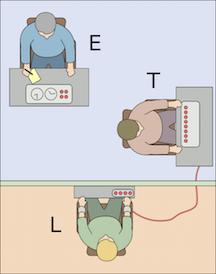 The teacher's job was to read a list of words that the learner would be asked to recall. If the learner failed to remember what the teacher had read, the teacher was instructed to administer an electric shock. Subsequent memory errors would result in shocks of increasing voltage. In reality, the shocks were never administered and what the teacher heard were prerecorded protests and shouts of pain.
The teacher's job was to read a list of words that the learner would be asked to recall. If the learner failed to remember what the teacher had read, the teacher was instructed to administer an electric shock. Subsequent memory errors would result in shocks of increasing voltage. In reality, the shocks were never administered and what the teacher heard were prerecorded protests and shouts of pain.
Milgram consciously chose a gray lab coat to wear during the experiments so as to appear more authoritative. Inevitably as the shocks – and the painful shouts coming from the learner – grew in intensity every teacher began to balk. They protested, saying they didn't wish to harm anyone. However, Milgram and his cohorts would insist the experiment had to be carried out to the very end, even after the "learner" had perhaps lost consciousness or died because they'd stopped responding altogether.
What Milgram found after studying more than a thousand "teacher" volunteers was that fully two-thirds, 65%, complied with orders to continue inflicting the painful shocks. From these results he drew several conclusions regarding the character of human nature, authority and obedience. He deduced that people interact socially in two basic states, they are either autonomous (taking full responsibility for their own actions) or agentic (passing responsibility along to another or others). He noted that in the agentic state people will hand off responsibility when they perceive that another has the legitimate authority (e.g., law enforcement, government, religious leader, etc.) to give orders.
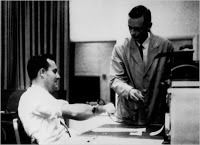 As it ran concurrent with the trial of Adolf Eichmann, Milgram's experiment had a potent effect on the way Americans viewed war criminals. Previously it was believed that war criminals' plea that they were "just following orders" was basically bogus. The belief was also held that Germans, in particular, respected authority more and were thus more compliant with military/governmental orders. Milgram seemed to blow all that into dust as his volunteers had been average Americans.
As it ran concurrent with the trial of Adolf Eichmann, Milgram's experiment had a potent effect on the way Americans viewed war criminals. Previously it was believed that war criminals' plea that they were "just following orders" was basically bogus. The belief was also held that Germans, in particular, respected authority more and were thus more compliant with military/governmental orders. Milgram seemed to blow all that into dust as his volunteers had been average Americans.
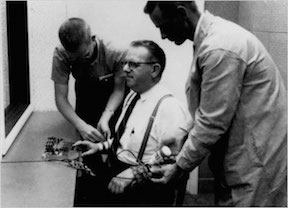 Much subsequent research has been carried out, not just on this topic, but on the very scientific legitimacy of Milgram's entire project. For example, scientists can no longer lie to participants about the nature of the experiment for which they are volunteering. Many of Milgram's volunteers carried painful psychological scars for years after being lead to believe (however briefly) that they had been responsible for someone else's injury or death. Then there is the question of how uniformly Milgram and his colleagues exercised their own authority over the volunteer "teachers." Tapes of those sessions reveal wide variance in the amount of coercion that was used to get people to continue flipping the shock switch.
Much subsequent research has been carried out, not just on this topic, but on the very scientific legitimacy of Milgram's entire project. For example, scientists can no longer lie to participants about the nature of the experiment for which they are volunteering. Many of Milgram's volunteers carried painful psychological scars for years after being lead to believe (however briefly) that they had been responsible for someone else's injury or death. Then there is the question of how uniformly Milgram and his colleagues exercised their own authority over the volunteer "teachers." Tapes of those sessions reveal wide variance in the amount of coercion that was used to get people to continue flipping the shock switch.
What darkness lies at the heart of human beings? Why and how does it emerge? Milgram opened a door so that scores of researchers – scientific, social, philosophical, religious, political – could walk through and examine the nature of what it is to be human.
Stanley Milgram
Graphic of The Experiment
Images of both "teacher" and "learner", courtesy of Psychology-4-Everyone
Filed under Medicine, Science and Tech
![]() This "beyond the book article" relates to A Meal in Winter. It originally ran in August 2016 and has been updated for the
October 2018 paperback edition.
Go to magazine.
This "beyond the book article" relates to A Meal in Winter. It originally ran in August 2016 and has been updated for the
October 2018 paperback edition.
Go to magazine.





The Flower Sisters
by Michelle Collins Anderson
From the new Fannie Flagg of the Ozarks, a richly-woven story of family, forgiveness, and reinvention.

The House on Biscayne Bay
by Chanel Cleeton
As death stalks a gothic mansion in Miami, the lives of two women intertwine as the past and present collide.

The Funeral Cryer by Wenyan Lu
Debut novelist Wenyan Lu brings us this witty yet profound story about one woman's midlife reawakening in contemporary rural China.
Your guide toexceptional books
BookBrowse seeks out and recommends the best in contemporary fiction and nonfiction—books that not only engage and entertain but also deepen our understanding of ourselves and the world around us.